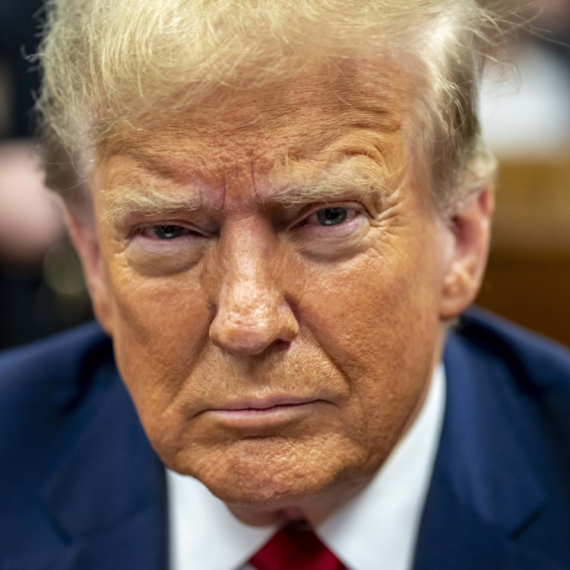European Commission VP: New growth injection
Wednesday, 29.04.2015.
11:15

European Commission VP: New growth injection
Jyrki Katainen, who is responsible for implementation of the Juncker Plan, has high hopes that this investment plan will boost economic growth in both weaker and wealthier EU member states, provided it is implemented wellEurope has to reinvent itself and the only way to do that is to embrace reforms and boost its external competiveness. Each member state has to work on that, including Greece, which was on a good path before the policy changes. The Commission wants to help Greece find the solution to its problems, but that solution must be fair from the Greek point of view and also from the perspective of other European tax payers, says Jyrki Katainen, European Commission Vice President for Jobs, Growth, Investment and Competitiveness.
Katainen, who is responsible for implementation of the Investment Plan for Europe (Juncker plan), which aims to revive investment in strategic projects around Europe and should unlock additional investment of at least €315 billion over the next three years, has high hopes that, if implemented well, the investment plan will boost economic growth in both weaker and wealthier EU members.
The ECB has launched its own monetary easing method that wasn’t uniformly embraced as a tool to boost the EU economy, though it presently seems to be yielding some positive results. Do you see them as sustainable and able to lead the EU towards the end of recession?
It is clear that ECB monetary decisions will help the eurozone, and the EU as a whole, to strengthen its economic growth. The monetary policy, together with very low interest rates and the very low price of oil, will stimulate the economy in the eurozone area. This combination is very welcome in the current situation.
The euro and the U.S. dollar have almost equal value today. Do you see that as a good opportunity to improve EU exports to other countries, or as a sign that the European economy is weak?
The exchange rate always reflects the economic fundamentals and it is not a secret that recovery has come quicker in the United States than in Europe. However, I have to say that there were other currencies that have depreciated more than the euro, and if we are looking at the nominal effective terms of the euro exchange rate, the euro is very close to its long term average. Of course, in the current state of play the exchange rate will help EU exporters.
You once warned that mutual resentment between citizens of the northern creditor states and poorer debtor countries may have fuelled euro scepticism and perhaps this may pose a threat to the unity of the 28-nation bloc. However, southern countries often see you as an austerity hawk who would rather add to divisions than to cohesion. What is your stance regarding the impact of austerity measures on EU cohesion?
We have to make sure that all member states can develop equally. One principle which is very important is that all member states respect rules we have decided together. A healthy economy in one country will help other countries and, vice versa, if there are weak economies, especially in the euro area, this has a negative effect on other eurozone member states. That is why it is very important that everybody does their homework. Right now the European Commission is encouraging member states to do their structural reforms, which will increase their competitiveness because a big part of our current challenges in the economy are structural in nature, and due to the fact that countries have not reformed themselves early enough. Having said that, we have to be ready to help, especially the countries which are in the most vulnerable position, and that is why our investment plan, for which I am responsible, is very important because it will help private investors to invest in riskier countries, but also for countries to step up more.
Do you think the creation of a banking union achieved the main goal of stabilising the eurozone, or is there also a need for fiscal unity?
I wish we would have had the banking union before the crisis. If that was the case, we would probably have managed to avoid the crisis we faced a couple of years ago. The banking union is very important in terms of financial stability and strengthening confidence in the currency union. We have to make sure we have a strong financial sector and that all member states pay attention to competitiveness and that fiscal policy is growth friendly.
But you still think fiscal policy should be kept at the national level?
We need deeper integration in some areas, especially in the single market area and with more fiscal responsibility at the national levels. A deeper fiscal union implies taxation and I don’t see that member states would like to give taxation rights to the EU level. We must be ready to assess what would be the next steps in fiscal integration, but it is unrealistic to expect that we would end up in situation where we would have just one European budget or EU taxation. This will not happen, but there are obviously some areas in which we need more integration in the longer run.
By saying that key reforms to pensions, labour markets and education are needed in order to keep European countries competitive with the rest of the world, how far would you go in repositioning the European social model?
I think there is a very strong commitment to maintain the European social model of market economy. Look at the Nordic countries in which the size of the public sector is very large - those are also the most competitive EU member states. As such, the combination of social protection, fairness and global competitiveness is a good combination. You don’t need to choose one above the others. Competitiveness is a way to finance the welfare society and that is why global competiveness, external competiveness, is the best friend of the social model of market economy.
According to Swedish social democrat Marita Ulvskog, your strength is that you “come from a Nordic country and so understand the importance of strong social partners on the labour market…” Do you think it is possible to revitalise social dialogue in the age of the mantra of flexible labour force?
There are big differences among the member states. In some of them social dialogue is an elementary part of policymaking, while in other countries the governments, employers and employees don’t have that much to do with one another. I support dialogue between social partners strongly, because it is the way to find the best solutions by combining global competitiveness and fairness.
You once said that combatting eurosceptics in the pan-European election would require EU leaders to address issues that are important to voters who support populist political parties. One of the main forces that fuelled populist movements on the left and the right were questions of high youth unemployment and the influx of immigrants. Which of these might be tackled through better economic policy; and is that the task of each European country on its own, or EU institutions?
We need both national and European action. For instance, public employment services are in the hands of member states and in that respect there are big differences between them. Some member states have very flexible, well-functioning labour services and in those countries the unemployment rate, especially among youngsters, is very low. There are also differences in the educational system, especially in terms of vocational training. For example, in Austria and Germany, where apprenticeship plays a crucial role, youth unemployment is the lowest. We can learn from each other and we have to spread the best practices from countries that are doing the best to countries that are not doing so well.
At the European level we have the European Union youth initiative and it has its own budget line in the European budget. So, the EU helps the most vulnerable countries where youth unemployment is very high. It is understandable that when people see high youth unemployment it destroys confidence in the future. That is why we have to act more, especially at the national level, but also at the European level.
One issue that is very important for me personally is the quality of teacher training. If you look at the unemployment rates or differences in external competitiveness they correlate very directly with the level of education and there I would like to influence member states’ policies on teacher training. It is a kind of new core thing when talking about quality of education.
And what do you think about the attitude toward immigrants? It is also one of the major issues influencing populist movements.
That is right. Europe has always been an open continent and the free movement of people is part of our values, meaning that our citizens can travel freely across borders. We also recognised our human responsibility for people suffering in other parts of the world. Even though the situation is very difficult in some of our member states, we should not close our borders and accuse even more vulnerable people of causing our own problems. This is also part of our social European model. Of course, the regulation must be fair and we do not need to accept social security shopping or social dumping in working life. However, the free movement of people within the EU is very important and I want to support it also in the future.
It seems that, according to various indices, there is a high risk of Greece withdrawing from the eurozone (Grexit), despite some progress in talks between Greece and its creditors. What is your opinion regarding the possibility of Grexit and its possible impact in the short and long term?
We will never speculate on Grexit, as this is not an issue we are working on. We are trying to solve problems, not speculate and make things worse. It is clear that the Greek government must stick to its commitments. The Commission wants to help to find the solution, but that solution must be fair from both the Greek point of view and from the point of view of other European tax payers.
In that context, how would you comment on the recent visit of Greek Prime Minister Alexis Tsipras to Russia?
All people have a right to visit whoever they want to visit and we don’t have any particular opinion on that issue. What interests us is whether they will stick to their commitments towards other European tax payers who are willing to help them.
Leading economic figures in the Greek government note that the crisis in Greece is just one symptom of the crisis in the fabric of the Eurozone, arguing that austerity measures are hurting everyone. Does such a reasoning seem plausible to you or not, and why?
If we look to Ireland, Portugal, Spain and Cyprus, we see that they were committed to reforming their countries and three of them have already exited the financial assistance programme, growth has returned and job creation has started within those countries. Before Christmas the situation was heading in the right direction in Greece too, even though the Greek people faced severe challenges and unemployment rates that were unacceptably high. Nevertheless, things were moving in the right direction and now, unfortunately, things have moved backwards. So it is difficult to find any other solution than to correct problematic things.
You are a supporter of the Juncker Plan for a European Strategic Investment Fund, though some observers remain reserved. How will this fund work and which investment areas should it support?
The new EFSI fund is part of the European Investment Bank and is an independent fund providing risk sharing elements like equity investment or junior tranche investments to the private sector. Private sector investors can contact EFSI independently and the management of the fund will analyse all the projects according to their merits. The Commission, member states or any other political body, will have no influence at all when it comes to the selections or the process. The key issue is to encourage private investments and concentrate on high risk projects. Among the sectors for investments are the energy sector, digital investments, research and innovations, as well as small and medium-sized enterprises.
Do you think the Juncker Plan can be helpful in creating a fairer and more integrated Europe, or will it fuel further division between the north and the south of the continent? How might the Juncker Plan impact on the high level of unemployment in Europe?
I think it is a very important plan in the sense that it will unite Europe more than it will divide us, because the fund will invest equally in riskier countries as in more stable and wealthy countries. The European budget will provide guarantees to the fund and that will make it possible for the fund to invest in riskier projects like economically viable projects in higher risk countries and in higher risk technology projects in wealthy countries.
Do you believe that, provided implementation goes well, some countries on the fringes of the EU, such as the Western Balkans and Serbia, may experience some positive economic waves?
We are all so connected. If the investment plan really manages to boost economic growth, it will, of course, have a positive impact on the neighbourhood. The more economic growth in Europe, the better it is for non-European countries, because we trade with each other and it provides people with more working opportunities.
How much do those sanctions hurt European economies and the pace of its recovery, and does the political goal justify the negative economic outcome?
At the aggregate level, the sanctions have not affected the European economy that much. Negative results were quite limited, but there are some countries and some areas in business which have suffered more than others. For instance, agricultural products, especially dairy products and some fruit and vegetables, have suffered more than others. Moreover, the countries trading the most with Russia have suffered more than others. However, at the aggregate level the negative impact on the European economy has been quite limited. Of course, I have to say that uncertainty in the world economy and our neighbourhood always has a negative impact on investment, so if, for instance, the situation was more stable in Ukraine and Russia it would have a more encouraging impact on the economy.
Despite some glitches, it seems China is on its way to becoming the world’s leading economy, which might in turn soon make the Yuan a second world reserve currency. How do you think the euro stands in that respect in the long run, compared to the U.S. dollar and the Chinese Yuan?
Everything depends on our competitiveness and that is why Europe has to reinvent itself. We have a very integrated market with both China and the United States, and that is why it is a good thing if China is growing. This provides more opportunities for European companies to sell their products and services. The only way to survive in tougher competition is to keep your own corners in good shape and pay particular attention to competitiveness.
It seems everyone wants to join the Asian Infrastructure Investment Bank (AIIB), which is regarded by some as a rival to the IMF, the World Bank and the Asian Development Bank (ADB), ruled by American, European and Japanese interests. How do you see the potential political and economic impact of this bank?
It is very difficult to assess the political impact of the fund. It is a new creation that aims to help investment and it is clear that investment in China will have a positive impact on economic growth in the rest of the world. I am also sure that China is willing to invest in pure technologies, for instance, and in that respect Europe can offer good products and knowhow for that purpose. I am also certain that China is interested in investing in Europe, as we have already seen happening during the last few years. So, this is also a positive thing.


























































Komentari 0